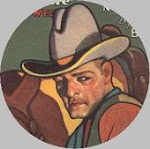The Sonora Noose by Jackson Lowry is a recent (February 2011) western novel published by Berkley. If the author’s name doesn’t sound familiar, it is a pseudonym of well-established writer Robert Vardeman, a name I’m more familiar with in the mystery and science fiction fields. But Vardeman is well at home in the western genre, having written a number of books with western settings under the name Karl Lassiter.
I actually like the name Jackson Lowry — it has a pulp-western author sound to it, a ring of authenticity. (That’s just my ears. Your ears may ring differently.)
Deputy Marshal Mason Barker is a worn out lawman — his body is starting to become a bit unreliable, but his passion for justice remains strong. He also is a loyal family man, and he knows that his feet are solidly planted on the right side of most moral arguments.
But like every other human being, he has weaknesses and faults.
To fight the pain continually aggravating and increasing in his back, Barker begins to rely on the comforts of laudanum. He also remains overly optimistic about bringing into line his son, a rebellious and mean-natured young man who refuses to conform to his parents’ expectations.
Barker’s real troubles begin with the eruption of a minor reign of terror instigated by a band of outlaws led by a vicious badman who calls himself the Sonora Kid. What begins as a series of robberies quickly escalates into a series of murders and massacres. Each event ends with the gang escaping into the twisty mazes of the canyons in the New Mexico mountain ranges.
Barker takes his work seriously, but he also sees the humor in situations. In some ways he reminds me of R.C. House’s fictional lawman, Cole Ryerson. (Unfortunately, House doesn't even rate an entry at Wikipedia.) Lowry does a fine job depicting Barker’s interactions with the townspeople of Mesilla, which Barker calls home, including the newly appointed sheriff, Dravecky. Particularly fine is Lowry’s handling of the relationship between Barker and the non-com for a company of Buffalo Soldiers, Sergeant Sturgeon.
All together, Lowry does a great job combining action, humor, pathos, pacing, and character into a nicely entertaining mix. The Sonora Noose is certainly worth checking out. And you can find a short western story by Lowry posted online at the Jackson Lowry site. It's titled "Fifteen Dollars." Just click here.
Review: Shakedown - William Ard writing as Ben Kerr
11 hours ago






